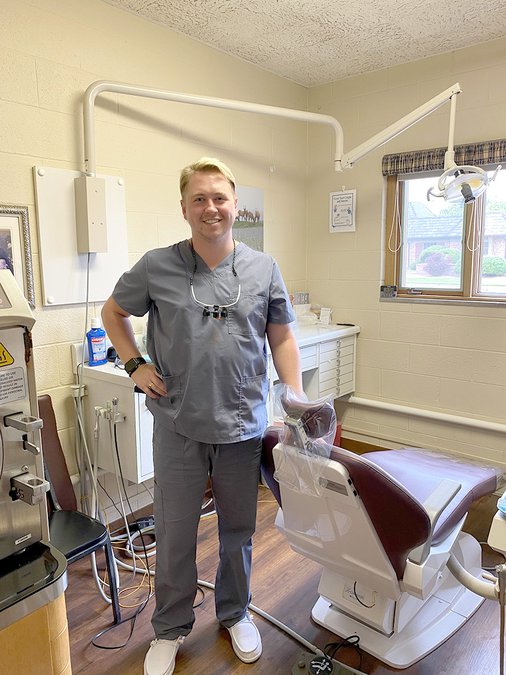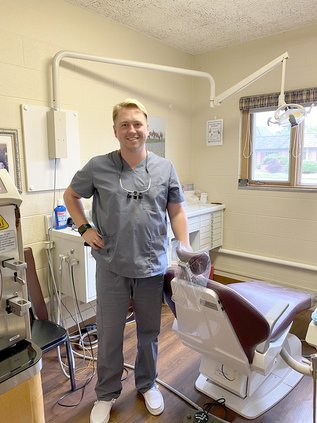Editor’s note: This week, the Tribune sat down with Ellinwood native Brett Lyman, DDS, who began work in August as a dentist at the office of Marc E. Huslig, DDS, Chtd. after recently completing dental school.
In becoming a dentist at the office of Marc E. Huslig, DDS, Chtd., Ellinwood native Brett Lyman, DDS, decided to return to his rural roots to make a difference in the area he’s always called home.
When he headed off to college, though, dentistry was not the direction he originally intended to go.
Originally, he said, he wanted to go to medical school but during his junior year of undergraduate studies at K-State, Lyman opted to go a different route after a conversation with his cousin.
“She graduated pre-med and decided to go the dentistry route,” he said. “(We talked about) the whole work/life balance and how much schooling I’d have to go through in med school versus dental school, and it seemed like a good option to try out.”
Also weighing in his decision to become a dentist was guidance from the late Marc Huslig, who passed away in April 2019. He now works at that practice, located at 2215 Broadway Ave. in Great Bend.
“He was my dentist, and he’d always been pushing me to go the dental route,” Lyman said. “It wound up being something I liked.”
Teri Huslig said Lyman spent a lot of time shadowing her late husband when he was younger, and Marc spent time working with Lyman as he worked his way through college.
That guidance not only led him to pursue a career in dentistry, it also led him to return to the county where he grew up to begin his practice after completing graduate school at Creighton University in Omaha, Neb.
Dr. Huslig, he said, always told him there was a significant need for dentists in the area, and this need became one of the driving factors in his decision to return.
Teri said as Lyman neared graduation, Dr. Huslig spent time encouraging him to return to the area.
“We were losing dentists around here, I have a whole bunch of family that still live around here, so when Doc died, it solidified the fact that I needed to come back,” Lyman said.
Teri said she and the office staff are excited Lyman did decide to return.
“It’s really nice to have back in the area and taking care of our patients,” she said. “He’s a local guy. He’s familiar with the area and the way of life here.”
Plus, Lyman said, when he looked into the option of corporate dentistry, the work-immersed lifestyle did not appeal to him.
“(Corporate dentists) are working up to six days a week, and they just didn’t seem as happy,” he said. “The older dentists, the ones that are retired, are saying, go into private practice, you’ll be much happier.”
Life as a rural dentist
Now that he has charted his course as a rural private-practice dentist, Lyman said it’s work he enjoys, and not just for what he does.
“I get to establish a relationship with my patients,” he said. “I get to get people out of pain, and I can help people immediately.”
During an average day, he said, he’ll see three or four patients in the morning, and three to five more usually in the afternoon. He works four days a week.
Typically, his work involves everything from basic dental cleaning and consultations, to hygienic exams and oral cancer screenings, to extractions, fillings and crown preparations. With more than one patient at a time, though, he said a lot of time is spent going back and forth between patients.
Because of the nature of the work he does for patients, he said, helping the them feel more at ease is important. This means really getting to know them instead of just fixing a problem.
This is especially important in a line of work where so many patients are scared or hesitant to come in.
“I want people to know they don’t have to be afraid to come to me and think they’re going to have to have a million things done in their mouth,” he said.
Because of this, he said, one of the first things he wants patients to know when he meets them for the first time is he shares their concerns about going to the dentist.
“I’m the same way. I don’t like getting my teeth worked on either; I’d rather be on this end of things, so I can empathize,” he said.
“Every dentist is different. Just give me a chance and I think you’ll be surprised,” he tells his patients.
Building the trust with patients helps them feel more comfortable in the dentist’s chair. Lyman believes being from the area also aids in building that trust, because so many know him from his time growing up in Ellinwood.
Teri believes Lyman being from the area will help him as he relates to patients, because he understands the rural way of life, and can relate to their needs and concerns.
He said keeping the communication open during the procedure is an important part of that process, maintaining conversation and letting the patients know it’s okay to ask questions or to let him know if they are not comfortable.
He also takes the time to introduce himself and help his patients get to know him as a person, and not just as a dentist. He described it as a “small-town approach” to dentistry.
“It’s putting it on their level and taking care of them like you’re taking care of one of your family members,” Lyman said.
Life outside of work
Outside of work, Lyman described his life as “pretty boring, I don’t do a whole lot.”
He still lives about a block from his parents in Ellinwood with his younger brother and his dog, Chance.
He spends a lot of time hanging out at home or with his family, watching Netflix, exercising when he can, playing a piano for which he took 10 years of lessons, and taking care of Chance.
It’s a laid-back rural life he loves, and part of what drew him here – back to his roots as a rural Kansas dentist.





